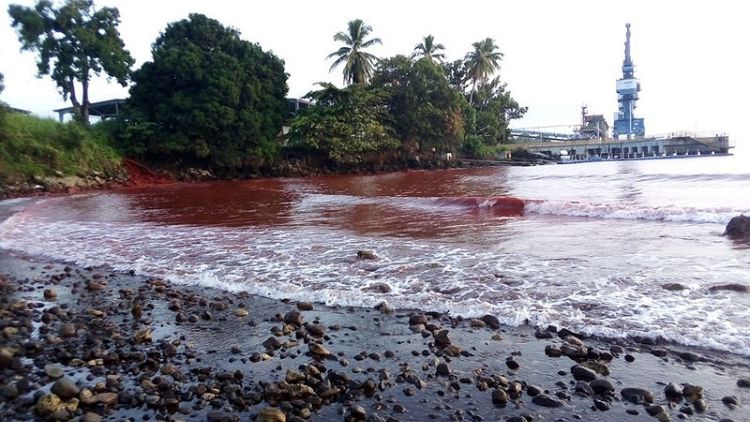By Melanie Burton and Tom Daly
MELBOURNE/BEIJING (Reuters) - Waste from a nickel plant in Papua New Guinea owned by Metallurgical Corporation of China spilled into the adjacent Basamuk Bay over the weekend, three sources told Reuters on Wednesday.
Locals noticed red discharge clouding parts of the bay that is next to the Ramu Nickel plant in Madang, Papua New Guinea, a local indigenous person who took photographs of the spillage told Reuters. The man declined to be identified because of the topic's sensitivity.
The head of Papua New Guinea's Mineral Resources Authority (MRA) said that its officials, as well as those from PNG's Conservation and Environment Protection Authority (CEPA), had put together a preliminary report on the incident.
"MRA Mines Inspectors and CEPA Scientists have been at the site since last Monday to conduct investigations," MRA Managing Director Jerry Garry told Reuters. He was unable to immediately offer additional details.
MCC, a unit of MinMetals, built and operates the plant, which produces nickel sulphate that is sent to China to the battery industry for electric vehicles.
MCC did not respond immediately to an official request for comment.
Ramu nickel mine in Papua New Guinea: https://fingfx.thomsonreuters.com/gfx/ce/7/6149/6132/RamuMine.png
Nickel sulphate is increasingly used in batteries for electric vehicles as the world transitions to a greener and less polluting economy.
However, investors concerned with responsible sourcing have demanded greater sustainability in procurement and along the supply chain.
A source close to MCC said the incident did not have any adverse impact on the environment.
"There is no impact on marine life and fish. The mining and environment ministry went there but both found no problem," the source said.
"There is no need to say anything about this. It was a small accident. There was a little leak ... but it has no effect on the environment."
However, Madang Governor Peter Yama called the Basamuk Bay slurry spillage "the worst environmental disaster in PNG history," according to a report by the country's Post-Courier newspaper on Monday.
He called for the government to immediately close down the project for its "poor environmental record," the report said.
Yama also said that the plant's mining licence expired in April, the Post-Courier reported.
PNG Prime Minister James Marape has vowed since he came into power in May to reap more benefits for the impoverished nation from its huge oil, gas and mineral resources partly through mining licence renegotiations.
The person who shared the pictures of the spill alleged that the nickel sulphate plant, which disposes of its treated mine waste by pumping them through a pipe into the deep ocean waters, has "destroyed many species of fishes and reefs" since starting up in 2012.
"That’s why as local traditional landowner citizen, I’m very concerned and have ill feelings to this developer and the government of PNG," the person said.
Ramu produced a record 35,355 tonnes of nickel and 3,275 tonnes of cobalt in concentrate according to Canada-listed Cobalt 27 Capital which holds an 8.6% stake in the operation, and rights to some supply. The company's Managing Director Anthony Milewski declined to comment on the incident.
(Reporting by Melanie Burton in MELBOURNE and Tom Daly in BEIJING, editing by Christian Schmollinger)
